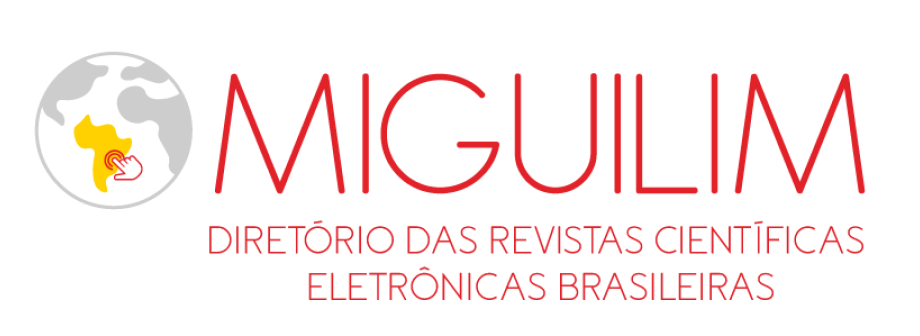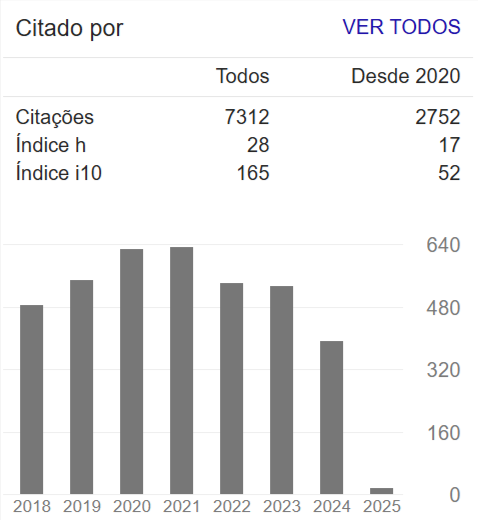About the Journal
FOCUS
The Revista Águas Subterrâneas (RAS) [Groundwater Journal] is a publication of the Brazilian Association of Groundwater (ABAS), dedicated to disseminating original scientific papers. As an open-access forum, RAS is widely accessible to scientists, researchers, professionals, and other interested parties, promoting a better understanding of hydrogeology and related fields.
SCOPE
RAS publishes peer-reviewed, indexed articles that address theoretical and applied aspects of hydrogeological science, integrating supporting disciplines such as geochemistry, geophysics, geomorphology, geobiology, speleology, surface water hydrology, tectonics, mathematics, numerical modeling, economics, and sociology. Topics include, but are not limited to:
- Theoretical and field studies at scales ranging from local to regional/global, covering short- and long-term periods, including geological timeframes;
- Innovations in field and laboratory techniques and instrumentation (e.g., hydrological, geochemical, geophysical, and mathematical);
- Integrated water resources management, with a focus on conjunctive uses and sustainability;
- Applications of hydrogeology in engineering, geophysics, geotechnics, and mining;
- State-of-the-art and philosophy of scientific methods in hydrogeology and related fields;
- Interactions between populations and hydrogeological systems;
- Economics of hydrogeological systems;
- Contributions of hydrogeology to environmental protection and the sustainable use of natural resources;
- Water sustainability and resilience, emphasizing the role of groundwater in addressing climate change;
- Groundwater in water policy and governance;
- The role of groundwater in agriculture and food security;
- Groundwater ecosystem services;
- Hydrogeology of karstic and fractured media systems;
- Hydrogeology in coastal environments, the Brazilian semi-arid region, and the Amazon;
- Diagnosis, remediation, and management of groundwater and contaminated soils;
- Investigation, monitoring, and numerical modeling of groundwater;
- Geochemistry and isotopes applied to groundwater studies;
- Groundwater in urban environments and public supply;
- Groundwater education and awareness;
- Managed aquifer recharge;
- Forensic investigation applied to hydrogeological studies;
- Application of big data, software, orbital sensors, and artificial intelligence in hydrogeological studies;
- International cooperation and transboundary aquifer management;
- History of hydrogeology and biographies of eminent hydrogeologists.
INDEXED SECTION
This section forms the journal's core, accepting only fully unpublished papers with original content, scientific relevance, and broad applicability. Submissions presenting new data and assessments of hydrogeological systems of general interest are also considered. Review papers will be accepted for evaluation by invitation or upon consultation with the editors. Papers published in this section are the only ones subjected to peer review and indexing.
NON-INDEXED SECTION
Event annals related to groundwater, particularly from the Groundwater Brazilian Congress, the International Congress on Subsurface Environment, and the National Meeting of Well Drillers, are published in specific supplements separate from the journal's regular issues.
PEER REVIEW SECTION
The manuscript review process follows a double-blind system, meaning that neither the reviewers nor the authors have access to each other’s identities.
The manuscript is checked using widely accepted plagiarism detection software. Suspect cases are returned to the authors with the appropriate justifications, and resubmissions may be made for re-evaluation.
Subsequently, the manuscript is sent to at least two reviewers (from renowned and independent national and international research institutions) for technical-scientific merit assessment.
The reviewers then issue independent opinions, recommending or rejecting the publication of the manuscript, with or without required revisions. Controversial cases are forwarded to additional reviewers to resolve doubts (double-blind review); the final decision is made by the associate editor in conjunction with the chief editors.
The associate editor informs the authors whether the paper is accepted, rejected, or requires revisions. In the latter case, the editor sends the reviewers' comments, requesting a revised version to be submitted within 21 days. The editor then initiates a new review round.
After acceptance, the final manuscript is sent to the RAS formatting department, and the process is monitored by the authors.
Failure to comply with editorial standards will result in the rejection of the submitted manuscript.
OPEN ACCESS POLICY
RAS provides immediate open access to its content, based on the principle that making scientific knowledge freely available to the public promotes greater democratization of information and advances scientific research. For more information about this approach, please visit the Public Knowledge Project website, the initiative that developed this system to improve academic and public research quality through the distribution of OJS and other open-access publishing tools.
In addition, all published articles are made available under the Creative Commons Atribuição 4.0 Internacional (CC BY 4.0) License. This license allows others to share, copy, distribute, adapt, and build upon the published material for any purpose, including commercial use, provided that proper credit is given to the original author(s) and the source of publication.
PUBLICATION FEE (APC POLICY)
RAS does not charge submission, review, publication, or access fees. Publication is completely free of charge for both authors and readers.
RESPONSIBILITY AND ETHICAL STATEMENTS
By submitting a manuscript, authors agree to the following:
- The manuscript has not been submitted or published in whole or in part in another journal or publication until the editorial process is complete.
- All authors have been personally involved and have significantly contributed to the conception, development, execution, or interpretation of the work and take responsibility for its content.
- All authors have agreed on authorship, read and approved the manuscript, and consented to its submission.
- Explicitly cite reproduced content from other sources and obtain permission to reproduce any content, if applicable.
- Provide the editors with a copy of any submitted manuscript containing overlapping or closely related content.
- Maintain accurate records of data associated with the submitted manuscript and make them available upon request.
- Declare all funding sources for the study and provide the names of funding agencies along with grant numbers.
- Disclose any potential conflicts of interest.
- Promptly notify the editor if a significant error in the manuscript or published work is identified and cooperate in correcting or retracting the article.
By accepting a reviewer assignment, reviewers agree to:
- Contribute to editorial decisions by reviewing the manuscript clearly, objectively, impartially, and in a timely manner.
- Notify the editor of any potential conflicting or competing interests (personal, financial, intellectual, professional, political, or religious).
- Identify relevant published works not cited by the authors.
- Notify the editor of any suspected ethical violations, such as previously published content.
- Maintain the confidentiality of the submitted manuscript.
During editorial tasks, editors commit to:
- Participating as Editorial Board members in developing and updating editorial policies.
- Communicating and implementing all editorial policies and recommendations.
- Conducting timely manuscript review and editorial processes, assisting authors, appointing reviewers, and making editorial decisions.
- Ensuring that the peer-review process remains anonymous for both authors and reviewers (double-blind review).
- Guaranteeing that submitted material remains confidential during review and editorial processes.
- Maintaining the integrity of the original scientific content.
- Ensuring manuscripts are free from plagiarism using appropriate tools.
- Declaring and refusing to edit manuscripts in cases of conflict of interest.
- Adopting reasonable procedures to investigate ethical complaints or conflicts of interest.
The Brazilian Association of Groundwater (ABAS), as the publisher, commits to:
- Assisting the Editorial Board in ensuring ethical publishing practices, in accordance with the guidelines described above.
- Providing and maintaining an adequate website for handling and storing all files and communications used during the review and editorial processes.
ERRORS, CORRECTIONS, AND MISCONDUCT
If a significant error is published requiring correction, or if misconduct is suspected (plagiarism, research fabrication, duplicate publication, or failure to disclose conflicts of interest), editors will review and decide on the matter. Authors will be informed and given the opportunity to respond to complaints. Appropriate measures will be taken depending on the severity of the issue, such as publishing a correction/erratum or issuing a formal retraction.
PUBLICATION FREQUENCY
Accepted and finalized papers are published on a continuous basis and organized into an annual volume, subdivided into multiple issues, each containing up to 10 articles (e.g., Vol. 12, No. 4).
INDEXING
- Portal de Periódicos da CAPES
- DOAJ Directory of Open Access Journals
- Latindex
- Google Acadêmico
- PKP Index - Public Knowledge Project
- UlrichsWeb - Global Serials Directories
- Scopus
- ROAD
- OpenAlex
- WIKIDATA
- Miguilim

















